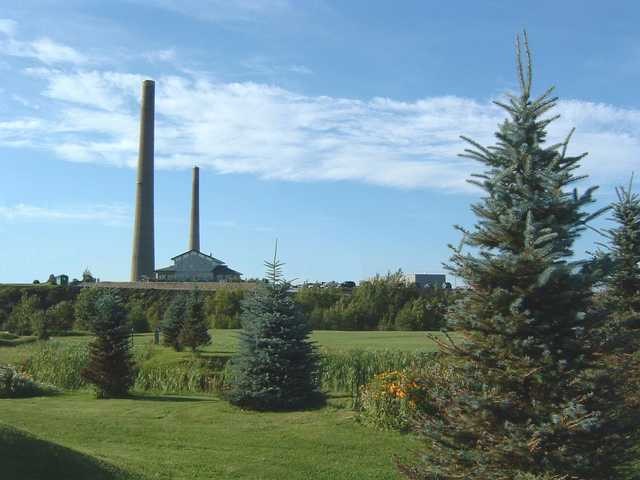A former Inco smelter site in Coniston is the centrepiece of the City of Greater Sudbury’s bid proposal to land a Ring of Fire ferrochrome processing plant.
In a Feb. 1 news release, the municipality, the Greater Sudbury Development Corporation, Wahnapitae First Nation and Atikameksheng Anishnawbek announced that they have finalized a “compelling” proposal in the competitive bid process to pursue a production facility to process chromite ore for Noront Resources.
The dormant Twin Stacks site, on the eastern outskirts of the city, is considered by city officials as the “optimal location” for the plant.
With permission from Vale Canada, the heavy industrial site is one of several potential sites that the city has pinpointed that “would meet or exceed Noront’s criteria.”
The city considers it “situated strategically from a logistics and services perspective.”
Sudbury is one of four cities – along with Sault Ste. Marie, Thunder Bay-Fort William First Nation, and Timmins – bidding for the furnace operation in a process laid down by Noront Resources, the leading mine developer in the James Bay lowlands.
The deadline for bid proposals is Feb. 2.
“We have the talent, we have a strategic location, we have a strong industrial base and we have a demonstrated commitment to environmental sustainability,” said Greater Sudbury Mayor Brian Bigger in a statement.
“This is the winning combination that we will put before Noront and I am proud to be working in concert with Wahnapitae First Nation Chief Ted Roque and Atikameksheng Anishnawbek Chief Steve Miller as we pursue this opportunity for our community.”
The construction of the $1-billion plant could conceivably begin in the next five to ten years.
To be designed as a scalable plant, the facility could create approximately 350 direct jobs at its initial stages and about 150 spinoff jobs.
But bigger issues remain with the route for an access road into the Ring of Fire mineral camp still to be finalized between the Ontario government and the area communities of the Matawa First Nations.
In January, a Sudbury contingent led by Bigger, Roque and Miller, along with economic development staff, visited the Outokumpu Ferrochrome Production Facility in Finland.
The 50-year-old site in Tornio employs the same kind of electric arc furnace technology that could potentially be employed in Northern Ontario. Municipal staff wanted particularly to see the environmental and sustainability practices at the site.
“The Greater Sudbury Development Corporation understands that this facility is a ‘once-in-a-generation’ opportunity for our city,” said board chair Wendy Watson.
“We were happy to support the work of economic development staff as they short-listed potential sites and undertook specific analyses to bolster the business case for a Greater Sudbury location.”
To take the temperature of the community, the City of Greater Sudbury commissioned Oraclepoll Research to undertake a survey of residents to assess their support for the construction of the smelter. The city claims 77 per cent are in favour of the plant.
Chromite is a critical ingredient in the production of stainless steel. The chromite would be shipped by rail to the plant where it would be processed into a semi-finished ferrochrome product to be shipped again to stainless steel manufacturing customers in the U.S.
Municipal officials in Sudbury have gone through this process once before.
In 2012, Cliffs Natural Resources had selected the former Moose Mountain site north of Capreol as the location for a processing plant before the Ohio miner decided to withdraw from Ontario.
Cliffs later sold their chromite claims in the Ring of Fire to Noront in 2015.
This time around, Noront wants more of a turnkey site with most of the infrastructure already in place, and the Moose Mountain site was rejected.
Whatever city is eventually selected, that chosen site will be subject to a rigorous environmental assessment process. A new smelter hasn’t been permitted in Ontario since the Kidd Metallurgical Site in Timmins in 1980.




